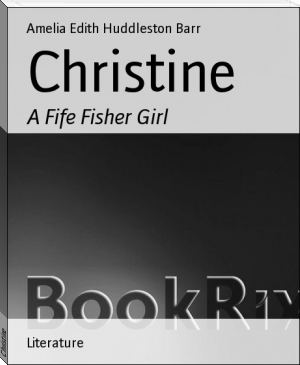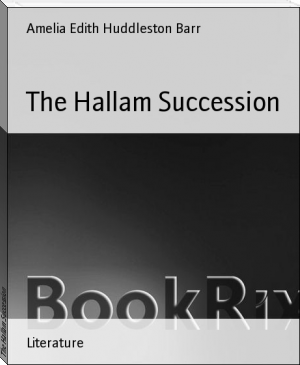Christine, Amelia Edith Huddleston Barr [chromebook ebook reader txt] 📗

- Author: Amelia Edith Huddleston Barr
Book online «Christine, Amelia Edith Huddleston Barr [chromebook ebook reader txt] 📗». Author Amelia Edith Huddleston Barr
"I can spare fifty pounds, Sir. I will gladly give it."
"You cannot spare it. You need every shilling of it, and as I have said--fifty pounds will make a man, or waste a man. Any Scotchman with youth, education, and fifty pounds, feels sure of his share of the world, or he is not worth his porridge."
"You forget, Sir, that I have the bonds of a false charge to fight."
"The charge was not false. Do what is right, in the future, and I promise you that it shall never more come up against you. But if you go on buying money with life and honor, you will have a second charge to meet. I know whereof I speak. I have had several interviews with Mr. Rath. He is my half-sister's nephew. He will do anything reasonable I ask of him."
"My God! And you let me go to prison, and blasted my good name, and made a beggar and a wreck of me. I won't have your help," and he turned to Christine, and cried out passionately, "Christine! Christine! Save me from a friend like this! Help me yoursel', dear lassie! Help Neil yoursel'! For Mither's sake help Neil yoursel'."
She went quickly to his side. She put her arms round him--her white, strong, motherly arms. She kissed his face, and wept with him, and she said with a loving passion, all those soft, cruddling, little sentences with which a mother soothes a hurt child. "I'll gie you a' the siller you want, dearie. I'll gie it to you as a free gift. I'll stand by ye through thick and thin. Guilty or not guilty, ye are my ain dear brither! I don't believe you're guilty! You are feyther's son, ye couldna be guilty. It's a' spite, and envy, and ill will. Mither bid me be kind to you, and I will be kind, though all the warld's against me!"
The Domine watched this scene with eyes full of tears, and a tender fatherly look. He finally put his elbow on the table, and rested his face in his hand, and no doubt he was praying for counsel. For he presently stood up, and said in a kind, familiar voice, "Neil, we must hurry, we have a little journey before us, if you get the next Atlantic steamer. We will talk this matter fairly out, when we are alone. It is cruel to force it on your sister. She knows, and you know also, that you may safely put your trust in me."
Then Christine left the room, and when she returned the two men were ready to leave the house. "Where are you taking Neil, Domine?" she asked, in that lowered voice Fear always uses. "Where are you taking my brother?"
"Only to Moville, Christine. There may be spies watching the outgoing steamers--especially the American Liners--so he had better go to Moville, and take his passage from there."
She did not answer. She bent her tearful, loving face to Neil's, and kissed him again, and again, and whispered hurriedly--"Write to me often, and soon," and when her hand unclasped from his, she left with him the money she had promised. The Domine pretended not to see the loving transaction, and the next moment the two men were wrapped up in the thick darkness, which seemed to swallow up even the sound of their footsteps.
That night Christine mingled her lonely cup of tea with tears, but they were tears that had healing in them. Those to whom love has caused no suffering, have never loved. All who have loved, have wept. Christine had given away her heart, it had been bruised and wounded--but ought she to love her brother less, because he had proved himself unworthy? If anything could bring him back to her trust, would it not be the prayers and tears born from her desolation? To regret, and to desire, between these two emotions the horizons recede; they are two spiritual levers, by which the soul can work miracles of grace.
So the days went on in alternating sunshine and storm. The Domine or Jamie came every day to see if all was well with her. Sometimes Norman stopped long enough on an evening visit, to talk about Neil and to wonder over his past and future. For though he had reached New York safely, they knew little of his life. He said he had found a clerkship in the general store of a merchant in a small town on the Hudson River, about sixty miles from New York; but he intimated it was only a resting place, till he felt ready to go to California. His great anxiety was to obtain the knowledge of his wife's hiding-place, for he was sure her brother was determined to keep them apart. And this conviction was gradually making a reconciliation with her the chief aim and desire of his unhappy life. He was sure the Domine knew where she was, and his letters to Christine urged on her constantly a determined effort to induce him to reveal her residence. Christine had made three efforts to win the Domine's confidence, and had then abandoned the attempt as utterly useless.
The herring-fishery with all its preparatory and after duties and settlements was now quite past, and the school was in full swing again, and the quiet days of St. Martin's summer were over the land. All the magnificent flowers of early autumn were dead, but the little purple daisy of St. Michael filled the hedges, and the crannies of the moor. In the garden, among the stones of its wall, the mint and the thyme and the wall flowers still swung in sunny hours, faint ethereal perfume; but it was like the prayers of the dying, broken and intermittent, the last offering of the passing autumn. There were gray and ghostly vapors in the early morning, and the ships went through them like spirits. The rains sobbed at the windows, and the wind was weary of the rain. Sometimes the wind got the best of both fog and rain, then it filled the sails of the ships, and with swelling canvas they strutted out with the gale.
In the mornings, if the sea was willing, she saw the fishermen hastening to the boats, with their oilskins over their arms, and water bottle swinging at their sides. And it was the sea after all, that was her true companion. The everlasting hills were not far away, but they were young compared with the old, old, gray sea. Its murmur, its loud beat of noisy waves, its still, small voice of mighty tides, circling majestically around the world, all spoke to her. Her blood ran with its tide, she wrote best when they were inflowing. When it was high water with the sea, it was high water with Christine's highest nature, spiritual and mental. Their sympathy was perfect, and if taken away from the sea, she would have been as miserable as a stormy petrel in a cage. So then, with the sea spread out before her, and her paper and pencils in hand, she hardly missed human companionship.
Still there were days when she wanted to talk, when singing did not satisfy her, and one morning when she had watched a boat come ashore, broadside on the rocks, she felt this need almost like a pain in her heart. No lives had been lost, and she had watched her brother Norman playing a godlike act of salvation with the life-boat, yet she had what she called "a sair heartache!"
"It isna for the men," she said softly, "they are a' safe, through God's mercy, and Norman's pluck and courage. I think it is for the poor, poor boat, beaten and lashed to pieces, on thae black, cruel rocks! Poor Boatie! left alane in her misery and death! And she did her best! Nae doubt o' that! She did her best, and she had to die!"
Just then there was a knock at the door, and though she had a moment's wonder at anyone's coming up the hill, so early in such rough weather, she cried out, "Come in. Lift the hasp, and come in." Then she turned round to see who would enter. It was Roberta Ruleson.
CHAPTER XIII
THE RIGHT MATE AND THE RIGHT TIME
For the destiny whereof they were worthy drew them unto this
end.--Wisdom of Solomon, xix, 4.
Mercifully ordain that we may become aged together.--Tobit, viii,
7.
The Bride of Love and Happiness!
Roberta Ruleson was the last person in the world Christine expected to see. She came in smiling, and with outstretched hand said, "Dear Christine, tell me that you are glad to see me."
"There's nane living, Roberta, saving your ain husband, I would be gladder to see."
"I have sent the carriage away, can I stop with you this night?"
"You can stay as long as you want to stay. I will be gey glad o' your company."
"I have long looked for an opportunity to come to you. At last I pretended to be very sick with rheumatism, and had a famous physician to see me. Of course I had looked up the symptoms I had to complain of, and I succeeded in deceiving him. He was puzzled about my freedom from fever, but I told him 'it came bad enough every third day,' and he said he would see me on the third day. My brother and his saucy wife left for Edinburgh yesterday, and they think I am safe in bed. I am safe here. I left Glasgow an hour after they did."
"Will you hae a cup of tea and a mouthful o' bread and broiled ham?"
"I am hungry and cold, and shall be very glad of it."
"Then go and tak' off your bonnet and cloak, and come to the fireside. I'll hae the food ready for you, in ten minutes."
Christine wanted a few minutes to consider. Was it right for her to tell Roberta all she knew, or must she follow the Domine's plan and be non-committal. She had not satisfied herself on this subject when Roberta returned to her, and she then hastily decided to do right and tell the truth whatever turned up. The tea and ham and bread were ready and Roberta sat down to them with the pleasant eagerness of a hungry child. She was, however, much changed. Her face showed plainly the wear and tear of a troubled, anxious mind, and as soon as she had taken a long drink of tea, she asked abruptly, "Christine, where is Neil?"
Then all Christine's hesitation vanished, and she answered frankly, "Neil is in a little town on the Hudson River, about a two hours' journey from New York."
"What is he doing?"
"He is bookkeeper in a shop there."
"What is the name of the town? Tell me truly, Christine."
"I will let you read his last letter. It came two days ago."
"Thank you! It would be a great comfort to me."
There was a John Knox teapot on the chimney-piece, and Christine lifted it down, removed the lid, and took Neil's letter out, and handed it to Roberta.
The woman's invincible sense of whatever was ridiculous or inconsistent, with a person or event, was instantly roused by the appearance of John Knox. She laughed with girlish merriment. "To think of John Knox interfering in my matrimonial difficulties!" she cried, "it is too funny! The old scold! How grim and gruff he looks! If he could





Comments (0)